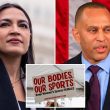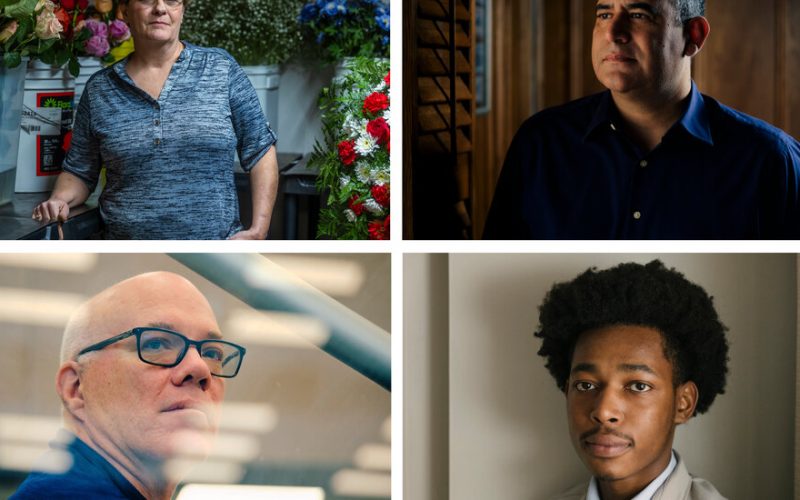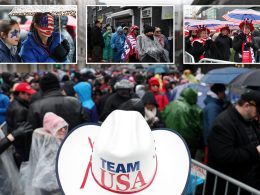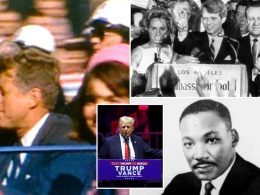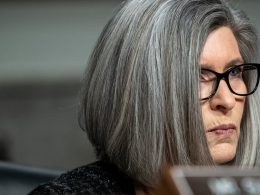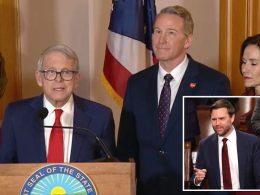As Donald J. Trump takes office once again, he will represent millions who enthusiastically support him, millions who forcefully oppose him and, perhaps most critically, millions in between.
This last group of voters may have been decisive in the November election: people who were unhappy about their choices, frustrated with the nation’s leadership and skeptical about the way forward.
Over the next 100 days, we will be keeping in touch with some of these voters, asking about their hopes and concerns as the second Trump administration unfolds. Many of them cast their votes for Mr. Trump, if with reservations, and will be watching closely his actions and words as the newly re-elected president. They had their first opportunity on Monday, with Mr. Trump’s inauguration speech.
‘It’s kind of hard to tell how this is going to go.’
Darlene Alfieri, 55, from Erie, Penn.
“He can sign all the papers he wants to sign,” said Darlene Alfieri, who watched the speech from the flower shop she runs. “But until it’s actually happening, it’s kind of hard to tell how this is going to go.”
Ms. Alfieri is a longtime Democrat whose growing frustration over the last four years led her to vote for Mr. Trump in 2024. She had serious reservations about him, and still does. But she came away from his inauguration speech feeling slightly optimistic.
Mr. Trump set a positive vision for the country, she said, and she agrees with many of his broader goals, like securing the border and bringing manufacturing back to America from overseas. But, Ms. Alfieri said, he has used that positive tone before while falling back to his my-way-or-the-highway approach. And as with all big plans, the details matter.
“OK it’s great that you want to do these things,” she said, “but how much is it going to cost, and how are we going to go about this that isn’t going to have some repercussions that we didn’t think about.” On many issues, especially tariffs, she feared that some larger long-term ambition would only mean short-term trouble for the little guy. That’s assuming Mr. Trump does follow through with many of these pledges, which she was also skeptical about.
“I used to tell my kids to clean their room,” she said. “That didn’t mean they actually did it.”
— Campbell Robertson
‘It should be exciting for any American this day.’
Jaime Escobar Jr., 46, from Roma, Texas
Jaime Escobar, Jr., the mayor of the border city of Roma, Texas, and an educator by day, listened to Mr. Trump’s speech on his phone while on the road, with a sense of optimism. Mr. Escobar, who grew up as a Democrat, voted last year for Mr. Trump after he experienced firsthand the migrant crisis under the Biden administration. His city of 11,000 was one of many that saw its already strained resources used to help the flow of new arrivals.
“It’s a new start, you know? A new administration is coming in,” he said. “It should be exciting for any American this day.”
As soon as Mr. Trump began delivering his vision for America under his administration, he said he began to worry that the “mood was a little serious.”
But as Mr. Trump went on, Mr. Escobar found themes that resonated with him and many of the people he knows in Starr County, a formerly Democratic area Mr. Trump flipped.
For the people in Roma, he said, “what mattered to them was the economy, their pockets and feeding their families, and then the border security issue.”
He said one criticism he had of Mr. Trump was that he could have done this without some of his boasting. “If there was a part that maybe he could have done without is just mentioning all the swing states that he won,” he said. “You already won. You don’t have to mention it again.”
— Edgar Sandoval
‘Changing the name of the Gulf of Mexico to the Gulf of America. It just seems silly.’
Perry Hunter, 55, from Sellersburg, Ind.
Perry Hunter, a high school social studies teacher, voted for write-in candidates in the 2016 and 2020 presidential elections because he said he didn’t like either major candidate. He only voted for Mr. Trump this time, he said, because he bristled at the way Mr. Trump was treated in his federal hush-money trial.
Watching the speech alone on his living room couch, Mr. Hunter was listening closely for how the incoming administration would handle immigration. He wants a more secure border, he said, but knows people who have walked all the way to the United States from their home countries after fleeing life-threatening situations and thinks they should be able to stay here. He said he hopes that the president focuses on deporting “the criminals that are in this country illegally.”
“The people that have risked everything to come here to make a better life, there should be a process for them to get citizenship,” he said.
Mr. Hunter, a married father of two, was surprised by one thing in the speech, he said, and that was Mr. Trump proclaiming that he would change the name of the Gulf of Mexico to the Gulf of America. Mr. Hunter said it was “hilarious,” and that “it seems silly with all the problems that we have.”
— Juliet Macur
‘He’s going to be able to cut a deal.’
Hamid Chaudry, 53, from Reading, Penn.
Hamid Chaudry is many things: a successful small-business owner, a faithful Muslim, a Pakistani immigrant and an American citizen. As he watched Mr. Trump’s speech — alone, because his wife and daughter are no fans of the new president — Mr. Chaudry found parts that resonated with him.
Mr. Chaudry voted for Mr. Trump last year because of his handling of the economy and he was heartened to see the lineup of tech billionaires behind the president. This was a sign, he said, that prosperous businessmen supported Mr. Trump’s policies and that they would be able to guide him in productive ways.
“They have done well for themselves,” he said, “they have run reputable companies, and their employees are mostly happy with them. That’s very encouraging.”
Mr. Chaudry was actively turned off, however, by the promises of a full-scale operation to deport millions of undocumented immigrants, which he fears would hamper the economy and leave untold numbers of broken families.
“That’s not conservative or Christian or Abrahamic faith values,” Mr. Chaudry said. He was convinced that there had to be some kind of middle ground.
This is why he gave Mr. Trump the benefit of the doubt: He said he thought Mr. Trump was a pragmatic deal maker, and that’s how he would govern.
“He’s going to be able to cut a deal, which is going to make his base happy but at the same time, will do justice to the American economy,” Mr. Chaudry said. “I hope and pray.”
— Campbell Robertson
‘I don’t think that what he’s done in the past and what he’s said in the past is something that MLK would be proud of.’
Isaiah Thompson, 22, from Washington, D.C.
Isaiah Thompson watched Mr. Trump’s speech on his cellphone at his home in Maryland. He found himself struck most by the timing of the ceremony: Mr. Trump was sworn in and delivered his first official words as the 47th president on the day this year that the nation celebrated the birth of Rev. Dr. Martin Luther King Jr.
Mr. Thompson, 22, a student at Howard University, was pleased that Mr. Trump acknowledged Dr. King, but he was put off by Mr. Trump’s mention of the attempt on his own life at rally in July. “It seemed like he was trying to draw parallels between his assassination attempt” and Dr. King’s murder, he said, and “positioning himself” as the person who could push Dr. King’s dreams forward.
“I don’t think that what he’s done in the past and what he’s said in the past is something that MLK would be proud of,” Mr. Thompson said, referencing racist language Mr. Trump has used.
Though he supports the Green Party, Mr. Thompson voted for Kamala Harris, vice president at the time, as a way to voice his opposition to Mr. Trump. He still has concerns about how far the immigration and border-control policies might extend, and worries about him abolishing the Department of Education. But he said he is interested in learning more about how the president plans to improve the economy.
— Audra D. S. Burch
‘A healthy society has to have rules.’
Tali Jackont, 57, from Los Angeles
Tali Jackont, an immigrant from Israel who put aside her longtime backing of Democrats to vote for Mr. Trump, watched the inauguration from the kitchen in her Los Angeles home.
Despite disagreeing with some of the content, Mr. Trump’s speech left her hopeful, she said, starting with the simple fact that Mr. Trump seemed to avoid his tendency to veer off script. The speech, she said, “wasn’t brilliant, it was nice. Let’s wait to see action.”
Ms. Jackont is a married Hebrew teacher with three adult sons. She grew up near Tel Aviv and feels deeply connected to Israel. While she isn’t a single-issue voter — the economy and immigration are some of her top issues — one of her primary concerns is ending the long conflict between her native country and its neighbors in the Middle East. She said she wished Trump had spent more time speaking about the region.
“He didn’t mention stuff like that,” she said. Maybe, she added, “that’s because negotiations are happening behind the scenes.
Still, Ms. Jackont appreciated Mr. Trump’s emphasis on bringing prices down and his rhetoric about stopping the flow of undocumented immigrants. “I am a rules follower,” she said. “A healthy society has to have rules, and if someone wants to be an immigrant, it has to be immigration according to the law.”
There will be heartbreaking stories, she added, “but this is his policy and we have to respect it.”
— Kurt Streeter
‘I’d like to see a lot more diversity in the audience.’
Dave Abdallah, 59, from Dearborn Heights, Mich.
Dave Abdallah did not vote for Mr. Trump. Nor did he back Ms. Harris.
The Arab American real estate agent cast his ballot for Jill Stein — a protest over his disenchantment with U.S. backing of the war in Gaza.
Still, as he watched Mr. Trump’s inauguration and the peaceful transition of power, Mr. Abdallah felt optimistic, like democracy was working.
“At least from the outside looking in,” he said, Democrats and Republicans, “hopefully, are planning on working together much more than in the past. I definitely liked that.”
Mr. Abdallah, who is Muslim, said he has been deeply bothered by much of Mr. Trump’s rhetoric and behavior, and disapproved of the so-called Muslim travel ban, imposed during Mr. Trump’s first term. That aside, he said he was “pretty comfortable with everything” in the Monday’s speech, noting Mr. Trump’s statements about ushering in a new era of peace.
He was, however, less excited about Mr. Trumps emphasis on stopping illegal immigration. “I’m not OK with people entering this country or any country illegally,” he said. “But do I believe personally that that’s our No. 1 issue?”
No, he said.
The optics of the day also gave Mr. Abdallah pause. “Quite honestly, his audience didn’t seem to be too diverse,” Mr. Abdallah said “I’d like to see a lot more diversity in the audience.”
— Kurt Streeter


